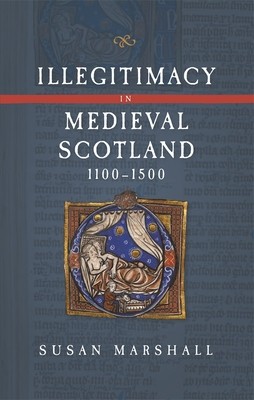
- We will send in 10–14 business days.
- Author: Susan Marshall
- Publisher: Boydell Press
- ISBN-10: 178327588X
- ISBN-13: 9781783275885
- Format: 15.6 x 23.4 x 1.6 cm, kieti viršeliai
- Language: English
- SAVE -10% with code: EXTRA
Reviews
Description
First full-length examination of bastardy in Scotland during the period, exploring its many ramifications throughout society.
The question of illegitimacy was as important and complex in Scotland as elsewhere in the Middle Ages. This book examines its legal, political, and social implications there between the eleventh and fifteenth centuries. It explores illegitimacy in relation to royal succession and to the inheritance of ordinary estates; investigates the role it played in major political events; and considers how being, or having, a bastard affected the lives of elite women, and the careers of people in ecclesiastical life.Scotland's earliest surviving legal treatise, Regiam Majestatem, denied inheritance rights to offspring legitimated by the intermarriage of their parents, while the law of the Church regarded such children as legitimate and, by implication, capable of inheritance. The volume scrutinises the tension between these two positions, alongside contemporary evidence which provides new insights into legal theory and practice concerning inheritance and birth status. By contextualising illegitimacy within its socio-political as well as legal settings, it challenges existing assumptions about the meaning and significance of bastardy in the Scottish middle ages.
EXTRA 10 % discount with code: EXTRA
The promotion ends in 22d.16:08:22
The discount code is valid when purchasing from 10 €. Discounts do not stack.
- Author: Susan Marshall
- Publisher: Boydell Press
- ISBN-10: 178327588X
- ISBN-13: 9781783275885
- Format: 15.6 x 23.4 x 1.6 cm, kieti viršeliai
- Language: English English
First full-length examination of bastardy in Scotland during the period, exploring its many ramifications throughout society.
The question of illegitimacy was as important and complex in Scotland as elsewhere in the Middle Ages. This book examines its legal, political, and social implications there between the eleventh and fifteenth centuries. It explores illegitimacy in relation to royal succession and to the inheritance of ordinary estates; investigates the role it played in major political events; and considers how being, or having, a bastard affected the lives of elite women, and the careers of people in ecclesiastical life.Scotland's earliest surviving legal treatise, Regiam Majestatem, denied inheritance rights to offspring legitimated by the intermarriage of their parents, while the law of the Church regarded such children as legitimate and, by implication, capable of inheritance. The volume scrutinises the tension between these two positions, alongside contemporary evidence which provides new insights into legal theory and practice concerning inheritance and birth status. By contextualising illegitimacy within its socio-political as well as legal settings, it challenges existing assumptions about the meaning and significance of bastardy in the Scottish middle ages.


Reviews